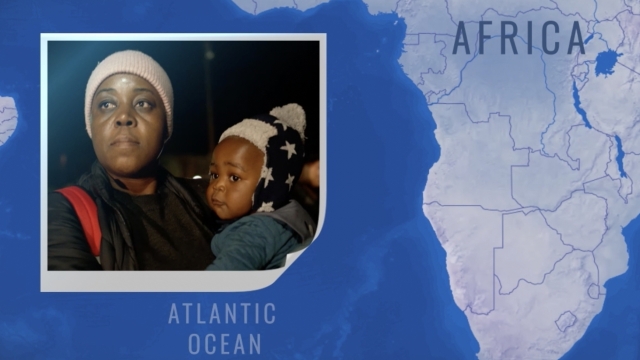Changes at the United States-Canada border have not stopped migrants from illegal crossings to seek asylum in Canada.
Scripps News National correspondent Axel Turcios has been covering the migrant crisis in the U.S. extensively. To take a closer look at the situation, he traveled to both sides of the border.
During his journey, he met Victoria Manhamo, a migrant mother traveling with her 11-month-old son Taylor.
"I'm following my husband and kids. We have been running away. Life is not safe," she said.
She is eager to be with her husband and other children waiting for her across the border.
"I'm very happy and I feel relieved. I'm just hoping and praying that they will allow me to enter," Manhamo said.
Her husband and two other children are in Canada. About a month ago they joined thousands of migrants seeking asylum in the country. But they were admitted into Canada at a time when migrants could still claim asylum even though they entered through unofficial border crossings.
For most seeking asylum in Canada, their journey begins at a bus station in New York.
Plattsburgh, New York is five hours north of New York City, where, from the Port Authority bus terminal in midtown Manhattan, a record number of migrants are leaving to Plattsburgh to then cross into Canada using an unofficial road known as Roxham Road.
But why has Roxham Road been a gateway to illegal crossings into Canada, and how have the changes to what is known as the Safe Third Country Agreement impacted asylum seekers?
The border between the U.S. and Canada is long, and not every mile is protected by border control. The are plenty of places migrants can cross the border "unofficially." Roxham Road is one of them.
The crossing is located on the border between New York state and Quebec, about 43 miles south of Montreal and 26 miles north of Plattsburgh.
To tackle the massive amount of people crossing into Quebec via Roxham Road, President Joe Biden and Canadian Prime Minister Justin Trudeau amended the 20-year-old Safe Third Country Agreement.
The idea was to allow both countries to better manage the flow of refugee claims. The deal worked because of the belief that both Canada and the U.S. are safe landing places for people seeking asylum. But the agreement had a loophole: it originally applied only to official border crossings.
Macdonald Scott is a Canadian immigration consultant with Carranza LLP and a member of the Migrant Rights Network.
"Because of the Safe Third Country agreement, you would be turned back to the United States and told to make your claim there," Scott said.
Now the agreement applies to the entire 3,145-mile land border between the countries. Last year, the Royal Canadian mounted police apprehended nearly 40,000 irregular border crossers nationally, and over 99% of them were in Quebec.
Is Manhamo willing to take the risk?
"Yes, I am willing to. I am willing to. I can’t be separated from my family," Manhamo said.
The mother and her 11-month-old son Taylor traveled 7,800 miles on a flight from Cape Town, South Africa to New York City on a visa, then took a five-hour bus ride to Plattsburgh, which is a 30-minute car ride to Roxham Road on the U.S. side of the border.
Manhamo is originally from Zimbabwe, but she and her family made Cape Town, South Africa their home.
"Life was good up until my daughter was abducted," Manhamo said.
Her daughter was rescued. However, reporting the alleged kidnapper to the police put their lives in danger.
"The family of the guy who was trying to abduct my daughter was following after us, wanted to fight my husband and my daughter. It wasn't safe for us to keep staying there. She was six years old at that time, but now she's eight. But up until now, they're following us.
Her bus arrived at a gas station in Plattsburgh at 3:05 in the morning. 25 minutes before the bus arrived, taxis and unmarked vans made their way into the gas station,"Manhamo said.
Manhamo and her son boarded a car along with other asylum seekers. They were taken to Roxham Road. Off-camera, the driver told me he charged them $40 each, but we heard migrants are known to pay up to $150.
After more than 24 hours, the mother and son finally arrive at Roxham Road, taking a peek at the other side of the border, hoping they’ll be allowed to stay in Canada.



